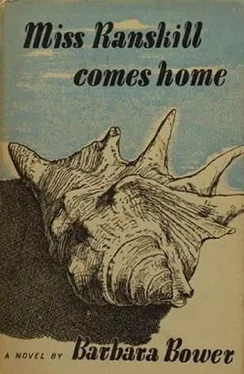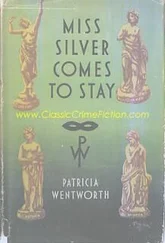Mrs Phillips’ outlook was Red, White and Blue. She stood stout and stalwart for thin red lines, for British Possessions coloured red, for white feathers (to be given to all men not in uniform), and for true blue of every shade. She believed in the flogging of boys and coloured persons, the shooting of shirkers, the quashing of Jews, the Feudal System, cold baths for invalids, the abolition of hot-water bottles, and (rather curiously) the torture of Adolf Hitler. She softened to horses and she adored dogs, whom she addressed in baby-talk.
Edith Ranskill was terrified of her and Nona Ranskill was not, though she found the frequent references to ‘that man of yours on the island’ almost intolerable.
Mrs Phillips took kindly to the island from the first; though she was obviously disappointed that the Carpenter had not been a native and that Miss Ranskill had not put her foot on his neck.
She admired her new friend’s conduct in building and launching the boat, but so identified herself with life on the island that any listener might have supposed that she had shared in the perils and hardships and sustained Miss Ranskill throughout. She used the Royal ‘We’ when talking of the island as often as she did when speaking to children, animals and the mentally deficient.
‘We don’t grumble about fish, do we? We know how hard it is to catch it,’ and ‘Little jobs about the house are nothing to us after all we have been through.’
In time she came to inhabit the island so largely that Miss Ranskill could scarcely recall it without the added vision of Mrs Phillips, looming along the beaches and taking command of the Carpenter. But when she referred to the ‘day we committed that poor man’s body to the deep’, Miss Ranskill snapped.
After that she was not allowed to forget her status as temporary guest and there was much hinting about the imminence of the nephews’ leaves.
‘But you mustn’t think of going yet ,’ declared Mrs Phillips. ‘We shall manage somehow.’
Edith too hinted vaguely about ‘future plans’, but was noncommittal about her share in them.
‘We might take a cottage together, of course, but cottages are so difficult to get and so expensive . Besides, I feel rather bound to Philippa, I promised to stay with her for the duration, though of course I didn’t know then that–’
‘That the sea would give up its dead at such an inconvenient time,’ concluded Miss Ranskill with a glance towards the left-hand corner of the mantelpiece.
‘We must take the photograph of that memorial window down.’
‘It’s a pity we can’t pawn the window.’
‘Nona!’
‘Did it cost very much?’
‘Well, you see I ordered it after your will was proved and after I’d paid the death duties. Then I was a fool about the house. I didn’t like the idea of profiteering so I let it at a nominal rent. After that the dividends went down and the cost of everything went up , and I made this tiresome arrangement with Mrs Phillips. I – I didn’t like to tell you before, but I signed an agreement with her. It seemed all right at the time, but now – And then, of course, I’m going to return your money as soon as I possibly can. We’ll get back the death duty in time, I suppose, but you know what lawyers are . So, just at the moment, even if I could break with Mrs Phillips, there wouldn’t be enough for the two of us in a cottage. You do see , don’t you, Nona?’
The conversation, so long avoided, took place three days after Miss Ranskill’s arrival at Mrs Phillips’ house.
‘Of course I see, Edith, and I expect I shall get a job quite easily. I thought if I might stay just for a week ( oh! spare me a little that I may recover my strength before I go hence and be no more seen ) till I’ve got my bearings? And then, I’ve got to go and see Mrs Reid.’
‘Surely you could write to her .’
Edith Ranskill had thriven since girlhood on problems and petty worries; the war had added its longer list – black-out, curtains, evacuees, billeted soldiers, Woolton pies, shortage of daily help, commandeering of houses, non-keeping quality of flour, rough hands, starchy diet, and now – her sister.
In the past, as one little problem grew stale, it had been succeeded quickly by another, so that her mind had not known a dull moment and even her hours of sleeplessness had been perpetually enlivened. The only impatience shown by her listeners, to whom she told her grievances, had come from the British sense of fair play that made them anxious not to miss their turn in relating their own ridiculously similar worries. Their own difficulties made them sympathetic; for they knew that if they would not listen to Edith she would not listen to them: nothing could be duller than to suffer the egg shortage in silence, in spite of the frequent assurances from America and the great of their own land that the unsung, uncomplaining housewives were being magnificent and the Kitchen Front of Britain an example to the whole world.
But in Nona Ranskill there was a problem that could not be shared. It had been all very well and even exciting at first when, as a new arrival, she had added importance to the household.
Miss Hoskins might spread her table with the grocer’s madeira cake (only obtainable by going early to the shop on Friday mornings and only eatable on that day or Saturday, because, by Sunday, each slice was tethered to the main body by slender wisps of something that looked like spiders’ webbing and played queer tricks with the digestion), paste sandwiches, honey and home-made biscuits. Edith need provide nothing but a few stale buns, so long as Nona was there to make up, by her odd reminiscences, for the lack of butter and the weakness of tea. The guests always hoped that something rather shocking might be said about the Carpenter. It was interesting to know someone who had really been on a desert island, though Miss Blake, a keen gardener, was disappointed that Miss Ranskill had not brought any plants back with her. Miss Stocks, whose favourite topics were adolescence, inhibitions and the problems of unmarried mothers, was annoyed that there had been no assaults by savages.
Even the Woolton pies lost their age-old savour because Nona insisted on their excellence.
It was difficult to grumble in her presence about the shortage of fish or the poor quality of shoe-leather.
All the niggling annoyances that had hedged up so gradually around Edith and her neighbours were new to Miss Ranskill, who had a disconcerting way of ignoring some and kicking against the prickles of others. She , surrounded and almost stifled by women, did not find the war isolating: the village was too thickly populated for her liking. The variety of voices, even more than differences of opinion, fretted her mind into confusion. Inconvenience of buses was no trouble to her either: if she missed one she could walk the four miles to the town. And walk she did, with unhurried stride through dust or mud, her shoes slung round her neck by their laces, as though she were a child gone paddling.
Time was unimportant to her. What did it matter if lunch was an hour early or supper a couple of hours late?
She was difficult about food too. In Mrs Phillips’ household, the rations were divided every Monday morning. There were three little pots for sugar, three little plates for butter, and three little tins for tea. If Mrs Phillips had a four o’clock guest, an extra spoonful from her tea-tin joined the other two spoonfuls in the pot. Edith, in her turn, behaved in the same dutiful way; but Nona would play no such scrupulous games. What was there, she squandered; and was content to drink cold water for the rest of the week. At least, she would have drunk cold water and eaten dry bread, had not the others preferred to victimise themselves and insisted on a martyred sharing-out again.
Читать дальше












